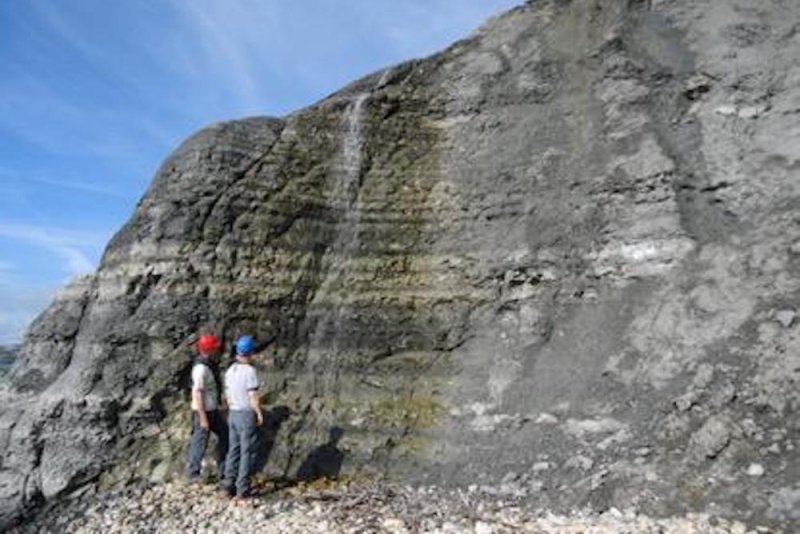By measuring shifts in the concentrations of carbon isotopes in ancient mudstone layers, scientists have identified the influence of planetary processes on Earth's ancient carbon cycles and climate change. Photo by Micha Ruhl/Trinity College Dublin
Feb. 11 (UPI) -- Scientists have discovered evidence that Earth's carbon cycle and global climate is influenced by periodic changes in the shape of Earth's path around the sun.
According to a new study, published this week in the journal PNAS, scientists found the evidence hiding in ancient layers of mudstone.
Chemical analysis of the ancient mudstone revealed links between past orbital changes and two major extinction events, the Triassic-Jurassic mass extinction event, around 201 million years ago, and the Toarcian extinction event, or Toarcian turnover, around 183 million years ago.
"Our work shows that for the 18 million years or so in between the Triassic-Jurassic mass extinction and the Toarcian oceanic anoxic event, Earth's global carbon cycle was in a constant state of change," Micha Ruhl, assistant professor in sedimentology at Trinity College Dublin in Ireland, said in a news release. "Periodic changes in the shape of Earth's orbit around the sun impacted on the amount of energy received by Earth from the sun, which in turn impacted climatic and environmental processes, as well as the carbon cycle, on local, regional and global scales."
Across shorter timescales, tectonic shifts and the eruption of large igneous provinces look like the primary drivers of shifts in Earth's climate. These factors work to drive the planet's carbon cycle, researchers of the new study said, but when Earth's carbon cycle is examined across larger timescales, the influence of larger planetary processes is revealed.
Previous studies have demonstrated the influence of orbital shifts on more recent periods of glaciation, but the latest findings are the first to show external forcing mechanisms were influencing the planet's ancient carbon cycles.
According to the latest analysis, ancient carbon-cycle patterns suggest Earth today should be cooling. However, the influence of anthropogenic greenhouse gas emissions has overpowered the influence of the cosmos on Earth's carbon cycle, causing Earth to rapidly warm.
By studying the fluctuations of certain carbon isotopes across large timescales, scientists can develop improved models for distinguishing the different processes that dictate the global carbon cycle and climate change.
The authors of the latest study hope to build upon their most recent findings through analysis of ancient rock samples, recovered from a soon-to-be-drilled one-kilometer borehole.















